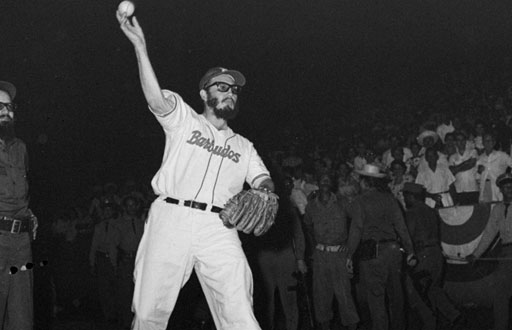The Cuban embargo was a bust, financially and politically. Of course, the idea now being bandied about, that trade and cultural exchange with America will reform a nation with dicey leadership, certainly is in ignorance of the facts, as Russia has proven. Such strategies must be decided on a case-by-case basis, and it certainly would seem that openness is currently the right tack to take with Cuba.
One interesting footnote: In retrospect, Cuba’s inscrutable decision last month allowing 19-year-old baseball prodigy Yoan Moncada to freely leave the island may have quietly announced the new relationship with the U.S. before President Obama did.
The opening of a 1960 Economist article which measured the then-new embargo just right:
“If Hurricane Nikita has subsided, the Fidel squall blows gustily. On Wednesday, the foundering relationship between the United States and Cuba was all but swamped by the State Department’s announcement of the prohibition of exports to Cuba. Briefly, the embargo, which has been hinted at for some weeks, will affect all exports except medicines and some food. Cuba’s purchases from the United States have lately amounted to something less than $300 million a year. This is roughly half what they were before the revolution; and one of the ways in which the State Department justifies the ban is that Cuba has discriminated against American goods. If every dollar-short country that has discriminated against American goods had been treated in this way, the United States would not have much trade left.
The embargo is bound to have two immediate and harmful results: it to offend a great many Latin Americans who, however much they disapprove of Castro, dislike even more the use of economic pressure for political ends. It will also, as Mr Mueller, the US Secretary of Commerce seemed to admit on Wednesday, push Cuba further into Moscow’s arms. Its utility will depend on the soundness of the State Department’s conviction that if Cuba is squeezed hard enough, Dr Castro will be forced out by his own people. Certainly, in the last few weeks, internal opposition to the regime has grown more active. Small groups of guerrilla fighters in central and eastern Cuba have been captured, and a number of rebels, among them three Americans, have been executed after military trials. But far from helping an incipient opposition, the United States’ embargo may well have the opposite effect. Dr Castro’s supporters are already in an embattled frame of mind, which an atmosphere of siege can only stiffen.”
Tags: Yoan Moncada

